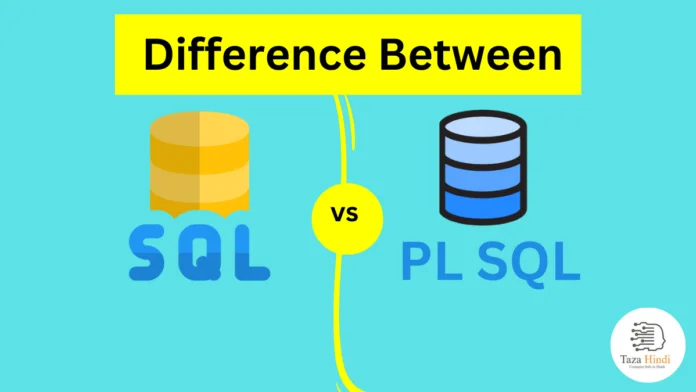In the world of database management systems, SQL and PL/SQL play significant roles. These two programming languages are commonly used in relational databases, with each serving its purpose. SQL is the standard language for managing and manipulating relational databases, while PL/SQL is a procedural language extension of SQL designed specifically for Oracle databases. In this article, I will explain what is SQL and PLSQL, their purposes, roles in database management, benefits, syntax / structure and then explore the difference between SQL and PLSQL.
What is SQL?
SQL, or Structured Query Language, is a standardized language used to manage and manipulate relational databases. It provides a set of commands and statements that allow users to retrieve, insert, update, and delete data in a relational database management system (RDBMS). SQL is widely used across different database platforms, including Oracle, MySQL, SQL Server, and PostgreSQL.
Purpose of SQL
The main purpose of SQL is to provide a universal language for interacting with relational databases. It allows users to perform various operations such as creating and modifying database schemas, querying data from tables, and defining relationships between tables. SQL provides a declarative approach, enabling users to specify what data they want to retrieve or modify without concerning themselves with the underlying implementation details.
Also Read: Difference between DBMS and RDBMS
Role of SQL in managing relational databases
SQL plays a crucial role in managing relational databases. It enables users to:
- Create and modify database schemas: SQL allows users to define the structure of a database by creating tables, specifying data types, constraints, and relationships between tables.
- Query data: SQL provides powerful querying capabilities to retrieve specific data from one or more tables using SELECT statements. Users can apply various conditions, sorting, grouping, and aggregating functions to filter and manipulate data.
- Insert, update, and delete data: SQL allows users to insert new records into tables, update existing records, and delete unwanted records using the INSERT, UPDATE, and DELETE statements.
- Manage database security: SQL provides commands for creating and managing user accounts, granting or revoking permissions on tables and other database objects, and ensuring data security.
Also Read: A Beginner’s Guide- How to Learn MongoDB from Scratch
Core components of SQL queries and statements
The core components of SQL queries and statements include:
- SELECT: The SELECT statement is used to retrieve data from one or more tables based on specified criteria. It allows users to specify the columns to retrieve, apply filters, and perform sorting and aggregation.
- INSERT: The INSERT statement is used to add new records into a table. Users provide the values to be inserted into the respective columns of the table.
- UPDATE: The UPDATE statement is used to modify existing records in a table. Users specify the columns and values to be updated, along with any conditions to identify the records to be modified.
- DELETE: The DELETE statement is used to remove records from a table based on specified conditions.
Also Read: How to Improve Your Programming Skills in 2023
What is PL/SQL?
PL/SQL, or Procedural Language/Structured Query Language, is an extension of SQL specifically designed for Oracle databases. It combines the power of SQL with procedural programming constructs, enabling users to develop complex and modular database applications.
Purpose of PL/SQL
The main purpose of PL/SQL is to provide a procedural programming language within the database environment. It allows users to write blocks of code that can be stored and executed on the database server. PL/SQL extends the capabilities of SQL by offering features such as variables, control structures, exception handling, and modular code organization.
Role of PL SQL in Oracle databases
PL/SQL plays a vital role in Oracle databases by enabling users to:
- Develop stored procedures and functions: PL/SQL allows users to write reusable code blocks called stored procedures and functions. These can be stored on the database server and executed whenever needed. Stored procedures and functions help improve performance, enhance data integrity, and provide encapsulation of business logic within the database.
- Implement business rules and validations: With PL/SQL, users can define complex business rules and validations directly within the database. This ensures that data integrity is maintained and that the required business logic is enforced during data manipulation operations.
- Handle exceptions and errors: PL/SQL provides robust exception handling mechanisms, allowing users to catch and handle errors that may occur during program execution. Exception handling ensures that applications can gracefully recover from errors and maintain data consistency.
- Improve performance and efficiency: PL/SQL offers performance enhancements through features like bulk processing, which allows processing multiple rows of data at once, reducing the number of round trips between the application and the database. Additionally, PL/SQL’s ability to execute code on the database server reduces network overhead and improves overall application performance.
Also Read: How to Learn the Basics of C Sharp Programming
Benefits of using PL/SQL over SQL
There are several advantages to using PL/SQL over SQL alone:
- Increased functionality: PL/SQL extends the capabilities of SQL by adding procedural programming constructs. This allows for the implementation of complex business logic and the ability to write reusable code blocks.
- Enhanced performance: PL/SQL’s ability to execute code on the database server minimizes network traffic and reduces the overhead of transferring data between the database and the application. This leads to improved performance and efficiency.
- Improved data integrity and security: PL/SQL enables the implementation of business rules and validations directly within the database. This ensures that data integrity is maintained and that only valid data is stored in the database.
- Simplified maintenance and code organization: PL/SQL allows for the creation of modular and reusable code blocks. This makes maintenance and updates easier, as changes can be made in a centralized location. It also promotes code organization and reusability, leading to cleaner and more manageable code.
Also Read: What is Computer Security and how to protect from attacks
Difference between SQL and PLSQL
The following table highlights the key differences between SQL and PLSQL:
| Factors | SQL | PLSQL |
| Syntax and Structure | SQL statements are typically single-line or multi-line commands that perform specific operations on the database. For example, a simple SQL statement may be: “SELECT * FROM Customers WHERE Country=’USA'”. SQL statements are executed individually, and their results are returned to the application. | PL/SQL, on the other hand, uses a block structure. A PL/SQL block consists of declarations, executable statements, and exception handling. |
| Functionality | SQL is primarily focused on data manipulation and retrieval. It provides commands such as SELECT, INSERT, UPDATE, and DELETE to perform operations on the database. SQL statements are executed one at a time, and the results are returned immediately. | PL/SQL, in addition to data manipulation, provides procedural programming capabilities. It allows the creation of reusable code blocks called procedures, functions, and packages. These code blocks can contain loops, conditional statements, variables, and other programming constructs. PL/SQL code blocks are stored on the database server and can be executed multiple times from different applications. |
| Performance and Execution | SQL statements are typically executed on the client-side application that connects to the database. The client sends SQL queries to the database server, which processes the queries and returns the results. This client-server interaction incurs network overhead and may affect performance. | PL/SQL, being a server-side language, is executed directly on the database server. This eliminates the need for multiple network round trips and can improve performance significantly. PL/SQL code blocks are stored on the server, and when invoked, they are executed within the database environment. |
| Error Handling | SQL provides limited error handling capabilities. When an error occurs during the execution of an SQL statement, it typically raises an exception that can be caught and handled by the application. | PL/SQL, on the other hand, offers robust error handling mechanisms. It provides a comprehensive exception handling framework, allowing developers to catch and handle specific exceptions. PL/SQL allows for the implementation of custom error messages, logging, and graceful recovery from errors. |
Conclusion
SQL and PL/SQL are two powerful languages used in relational databases, with each serving its purpose. SQL is the standard language for managing relational databases, providing the ability to retrieve, insert, update, and delete data. On the other hand, PL/SQL is an extension of SQL specifically designed for Oracle databases, offering procedural programming capabilities and enhancing database development and performance.
Also Read: How to Make Chicken Pot Pie at Home: Step-by-Step Guide
FAQs
-
Can I use SQL and PL/SQL interchangeably?
While SQL and PL/SQL share similarities and can be used together, they serve different purposes. SQL is primarily used for data manipulation and retrieval, while PL/SQL adds procedural programming constructs to SQL for implementing business logic and enhancing database operations.
-
Which language should I choose, SQL or PL/SQL?
The choice between SQL and PL/SQL depends on your specific requirements. If you need to perform basic database operations like querying data, inserting records, or updating tables, SQL alone may suffice. However, if you require more advanced functionality, such as implementing complex business logic, handling exceptions, or enhancing performance, then PL/SQL would be a better choice.
-
Can I use PL/SQL with databases other than Oracle?
PL/SQL is specifically designed for Oracle databases. While other database management systems may have their own procedural language extensions, the syntax and functionality of PL/SQL are specific to Oracle. If you are working with a different database system, you would need to use the procedural language supported by that system.
-
Can I mix SQL and PL/SQL code in the same application?
Yes, it is possible to mix SQL and PL/SQL code within the same application. SQL is often used for basic data manipulation operations, while PL/SQL is used for implementing complex logic and business rules. By combining the two languages, you can leverage the strengths of each to build comprehensive database applications.
-
Can I execute SQL statements within a PL/SQL block?
Yes, you can execute SQL statements within a PL/SQL block. PL/SQL provides the capability to embed SQL statements within its code blocks. This allows you to perform data manipulation or retrieve data using SQL statements while also incorporating procedural programming constructs provided by PL/SQL.



